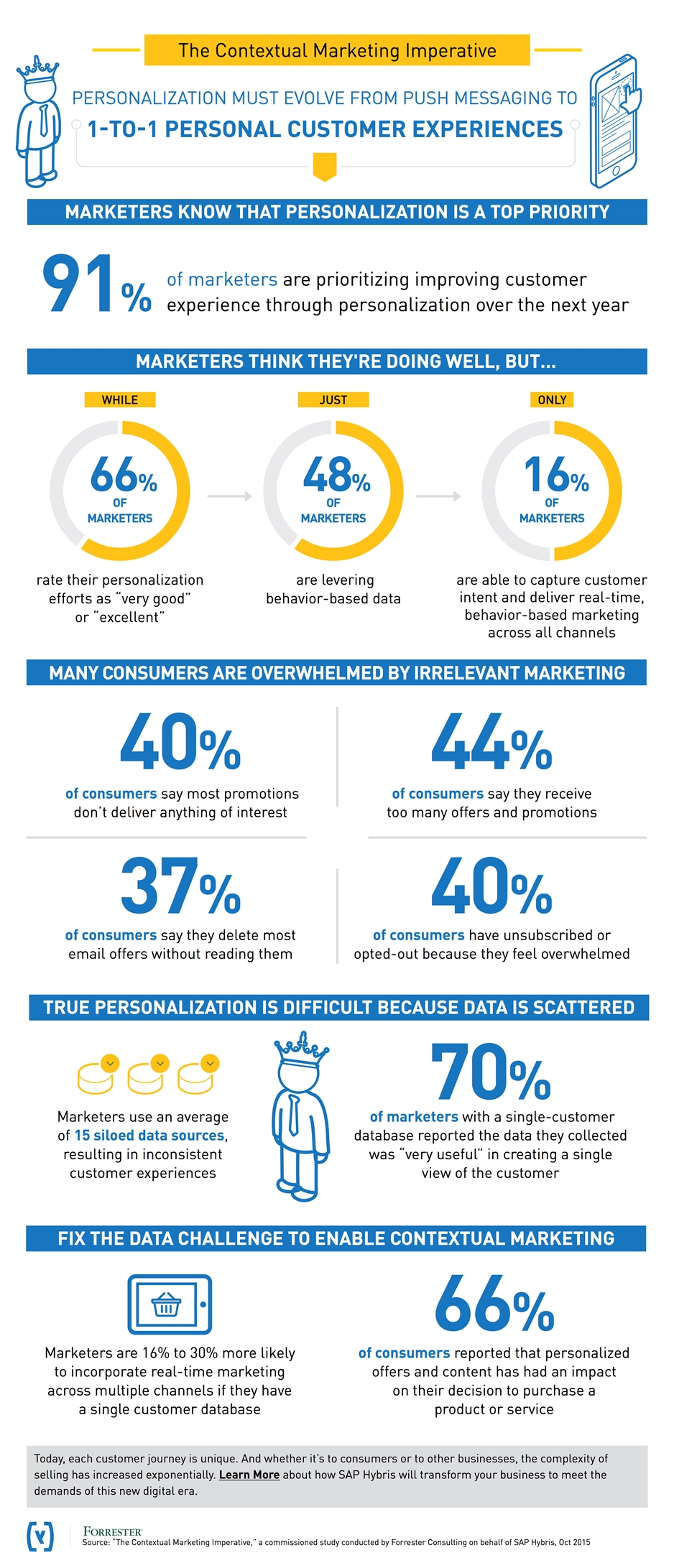Study Reveals Brands are failing at personalization, causing customer experience to suffer and demonstrating need for contextualized experiences.
 hybris, an SAP company, has announced the findings of an October 2015 commissioned study conducted by Forrester Consulting on behalf of hybris titled “The Contextual Marketing Imperative: the evolution of personalization from push messaging to one-to-one personal customer experiences.”
hybris, an SAP company, has announced the findings of an October 2015 commissioned study conducted by Forrester Consulting on behalf of hybris titled “The Contextual Marketing Imperative: the evolution of personalization from push messaging to one-to-one personal customer experiences.”
Following an in-depth survey in the U.S., EMEA and APAC regions of 1,200 consumers and 200 advertising and marketing professionals at organizations with 500 or more employees, the study uncovers a distinct gap between consumers’ expectations of personalized marketing and what marketers are actually delivering.
Pointing to this disconnect and the need for brands to contextualize each customer engagement, study findings reveal:
- While 66 percent of marketers rate their efforts at personalization as “very good” or “excellent,” just 31 percent of consumers report companies are consistently delivering personalized, cross-channel experiences
- Forty percent of consumers say most promotions don’t deliver anything of interest
- Forty-four percent of consumers say they receive too many offers and promotions
- Thirty-seven percent of consumers say they delete most email offers and promotions without reading them
- Forty percent of consumers have unsubscribed or opted-out because they feel overwhelmed
- Among those consumers reporting less-than-satisfactory personalized experiences, 61 percent said they were somewhat or much less likely to take advantage of future offers
Because consumers are sharing so much personal data with brands, they expect value in return – in the form of transactional perks and improved customer experience.While most marketers seek to improve personalized customer experiences from this customer data, their strategies are immature and their marketing efforts are falling short in this regard. Many still rely on segmentation methods that target certain demographics, such as a specific age group, which is not nearly enough to engage
customers.
According to the study:
- Seventy percent of consumers surveyed said they are aware that companies use personal information to send them targeted offers
- Seventy-four percent of consumers are “somewhat” or “very comfortable” with companies using data about them to provide personalized experiences
- While 66 percent of marketers use demographics to create targeted content offers and 44 percent say they use demographic categories to create at least some level of personalization for unidentified prospective customers, just half are using more sophisticated methods, such as leveraging data extracted from loyalty programs (52 percent) or behavior-based data (48 percent)
- In fact, 91 percent of marketers surveyed are prioritizing improving customer experience through personalization over the next year
“Consumers today are bombarded with more marketing messages across more channels than ever before, and the vast majority of these communications are irrelevant,” said Charles Nicholls, SVP Product Strategy, Marketing Solutions at SAP Hybris. “For this reason, it’s paramount that organizations are able to break through the noise and engage with customers on a one-to-one basis. To make this a reality, marketers must go beyond traditional personalization and towards contextualization by leveraging real-time signals of customer intent at the moment when the customer chooses to interact with the brand.”
Despite the challenges marketers face in delivering contextual experiences, some are beginning to see signs of success. The key has been in centralizing customer data to capture real-time customer intent. The following study findings support this approach:
- While only 16 percent of marketers surveyed currently have the capability to capture customer intent and deliver real-time, behavior-based marketing across all channels, an emerging set of more sophisticated marketers are starting to get it right when it comes to contextualized marketing efforts
- Of the 22 percent of marketers surveyed who each have a single customer database, 70 percent reported the data they collected was “very useful” in creating a single view of the customer, compared with just 52 percent of those without a unified database
- Armed with this valuable data across the customer journey, these marketers are 16 to 30 percent more likely to incorporate real-time marketing across multiple channels

The full study can be downloaded here.




